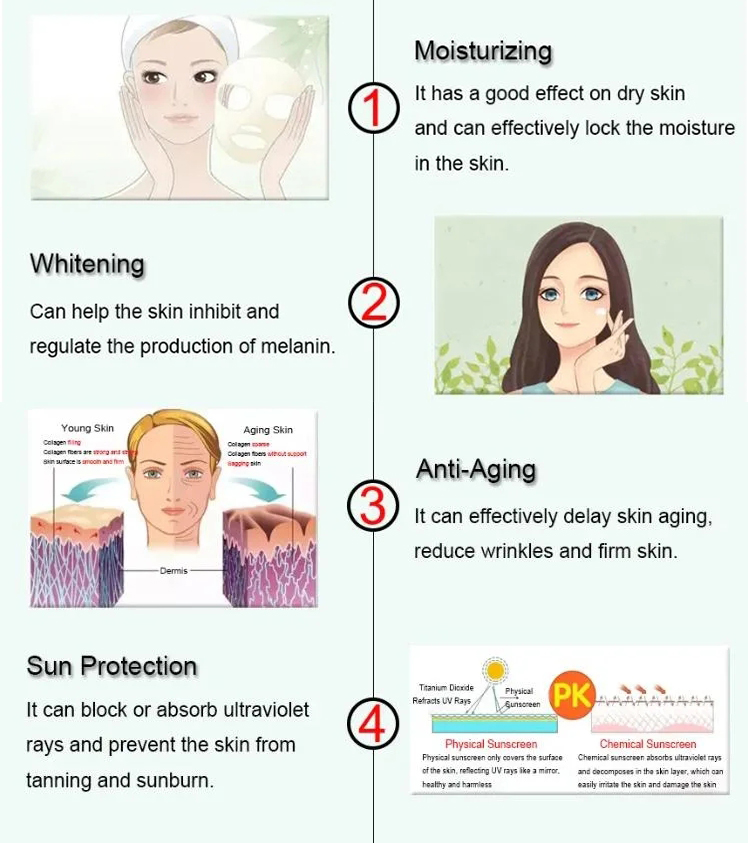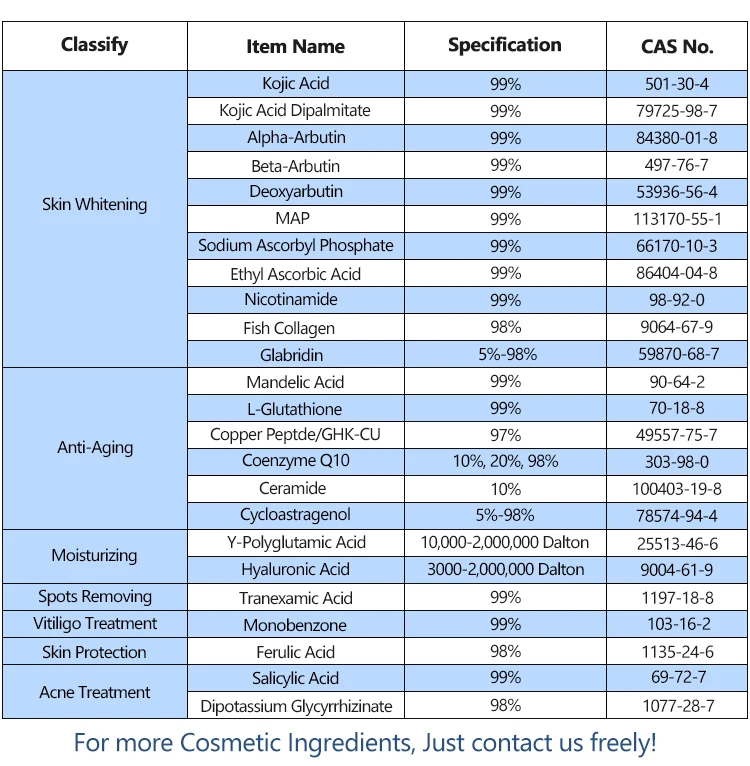Ascorbyl Tetraisopalmitate is a lipid-soluble derivative of ascorbic acid, which is also known as vitamin C. This derivative is commonly used in skincare and cosmetic products due to its stability and ability to penetrate the skin more effectively than traditional vitamin C formulations.
Applications of Ascorbyl Tetraisopalmitate
Antioxidant Properties: Like vitamin C, Ascorbyl Tetraisopalmitate possesses antioxidant properties. It helps protect the skin from free radical damage caused by exposure to environmental stressors such as UV radiation and pollution.
Collagen Synthesis: Vitamin C is essential for collagen synthesis, a protein that provides structure to the skin. Ascorbyl Tetraisopalmitate may promote collagen production, contributing to skin firmness and elasticity.
Skin Brightening: Ascorbyl Tetraisopalmitate has skin-brightening properties. It can help reduce the appearance of dark spots, hyperpigmentation, and uneven skin tone.
Anti-Aging Effects: By promoting collagen production and protecting against oxidative stress, Ascorbyl Tetraisopalmitate may help reduce the signs of aging, including fine lines and wrinkles.
Stability: One significant advantage of Ascorbyl Tetraisopalmitate is its stability. It is less prone to oxidation compared to other forms of vitamin C, which means it remains effective for a more extended period, even in formulations exposed to air and light.

Suitable for Sensitive Skin: Ascorbyl Tetraisopalmitate is considered gentler on the skin compared to some other forms of vitamin C. This makes it suitable for individuals with sensitive skin who may experience irritation with other vitamin C derivatives.
Hydration: The lipid-soluble nature of Ascorbyl Tetraisopalmitate can contribute to the moisturizing properties of skincare formulations, helping to hydrate the skin.
Combination with Other Ingredients: Ascorbyl Tetraisopalmitate is often used in combination with other active ingredients in skincare products, such as hyaluronic acid, peptides, and retinoids, to enhance overall skin health and address multiple concerns.
It’s important to note that individual responses to skincare ingredients can vary, and it’s advisable to perform a patch test before incorporating new products into your routine. Additionally, sunscreen should be used alongside products containing vitamin C derivatives to maximize their effectiveness and protect the skin from UV damage.
Adverse effects of Ascorbyl Tetraisopalmitate
Ascorbyl Tetraisopalmitate is a stable derivative of vitamin C that is often used in skincare products for its potential benefits. It is known for its ability to provide antioxidant properties and support collagen synthesis. However, like any skincare ingredient, it may have potential adverse effects for some individuals. It’s important to note that individual reactions can vary, and not everyone will experience the same effects. Here are some possible adverse effects associated with Ascorbyl Tetraisopalmitate:
Skin Irritation: Some individuals may be sensitive to vitamin C derivatives, leading to skin irritation. This can manifest as redness, itching, or a burning sensation. If you have sensitive skin, it’s advisable to perform a patch test before incorporating products containing this ingredient into your regular skincare routine.
Allergic Reactions: Allergic reactions are rare but possible. If you have a known allergy to vitamin C or any of the components in the product, it’s crucial to avoid using it.

Acne Breakouts: Although vitamin C is generally considered beneficial for acne-prone skin, some individuals may experience breakouts or worsening of existing acne. This can be due to individual skin sensitivity or the presence of other ingredients in the formulation.
Photosensitivity: While Ascorbyl Tetraisopalmitate is less likely to cause photosensitivity compared to some other forms of vitamin C, it’s essential to use sunscreen during the day when using products containing this ingredient. Vitamin C derivatives can potentially increase sensitivity to the sun.
Stability Issues: Despite being a stable form of vitamin C, Ascorbyl Tetraisopalmitate may still degrade over time, especially if exposed to light, air, or high temperatures. This can reduce its effectiveness, and in some cases, degraded products may cause skin irritation.
It’s crucial to consult with a dermatologist or skincare professional if you have any concerns or if you experience adverse effects. They can provide personalized advice based on your skin type, existing skincare routine, and any specific conditions or concerns you may have. Additionally, always follow the recommended usage instructions provided by the product manufacturer.
